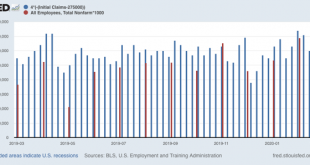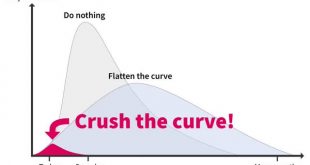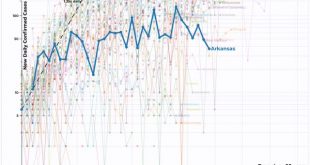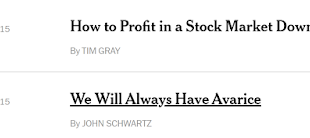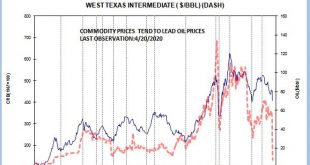Jobless claims still point to over 20,000,000 lost jobs in April, 15%+ unemployment rate As I’ve written in the past few weeks, the number of initial jobless claims correlates roughly with the number of net new jobs added or subtracted in any given month. Normally there is too much noise for it to be of much value, but with the huge spike in the past month, the signal will come through much more strongly. Here’s what the crude correlation looks like...
Read More »The actual US coronavirus trajectory: “flattening the curve” at least until 2021
The actual US coronavirus trajectory: “flattening the curve” at least until 2021 “Flattening the curve” was not such an appetizing option either, because it meant that *everybody* got infected with the disease during the period of flattening, and so the death toll would still be horrifying, perhaps 1% to 3%. It also meant that the period that the infection would curtail society was extended to several years. Shortly a much better alternative, based on...
Read More »Why a failed opening today may lead to a slower recovery when the epidemic has faded
Matt Yglesias has a good piece up explaining why “opening” the economy now won’t save the economy. The reason is that people will continue to avoid contact with others until the epidemic is brought under control. Simply allowing restaurants, theaters, and workplaces to open will not change this basic fact. Indeed, airlines are still open for business, but the demand for air travel has nosedived as people (understandably) avoid being sealed in a poorly...
Read More »Trends in US States compared by coronavirus response
Trends in US States compared by coronavirus response I mentioned over the weekend that I wanted to break out and look at some different aspects of the coronavirus pandemic. Here’s the first: how are States at different ends of the restrictions and testing spectrums faring? Seven States have never even mandated lockdowns. Let’s look at these, alphabetically: Arkansas: Iowa: Figure 1 Nebraska: North Dakota South Dakota: Utah: Wyoming: Four of the seven...
Read More »Does Google’s Search Algorithm Protect the New York Times?
Does Google’s Search Algorithm Protect the New York Times? Yesterday morning, after reading the Sunday New York Times, I posted two pieces on EconoSpeak within a few minutes of each other. One was a short, cute little item (a visual grab from the paper) entitled “The Art of Juxtaposition”; the other was a longer, more substantial takedown of a deficit hysteria “analysis” I called “The Usual Deficit Blather from the New York Times”. As usual, I...
Read More »Covid 19 Shutdown Politics
Advocates of quickly ending the shutdowns are in the news. Mostly, because one of them is President. Like most Americans, I think reopening soon would be a mistake (and remember I am in Italy where the shut down is severe compared to any State in the USA). I’m just going to assume that reopening by May 1 is a bad idea and try to understand who advocates it and why they do. First the vast majority of Americans do not support reopening soon. There was the...
Read More »Towards a modern “History of Republics”: a consideration of William Everdell’s “The End of Kings: A History of Republics and Republicans”
Towards a modern “History of Republics”: a consideration of William Everdell’s “The End of Kings: A History of Republics and Republicans” In view of the horrific damage that the Trump Administration has done to the American Republic, during the past year I have done extensive reading of the histories of a number of the most successful or durable Republics over time. The reason has been to try to answer the question of whether there is an overarching...
Read More »The Art of Juxtaposition
The Art of Juxtaposition Seen in today’s New York Times in Print:
Read More »Open thread Aprl 21, 2020
OIL PRICES
Oil prices are collapsing as West Texas intermediate is now trading at just over $11/bbl Oil prices move to the point where the marginal supply is profitable or unprofitable. In today’s world the marginal oil supply is US fracked oil. But the economics of fracked oil differs from traditional oil in that the current cost of production is very high as compared to most traditional sources where current costs are relative insignificant and the bulk of the...
Read More » The Angry Bear
The Angry Bear

